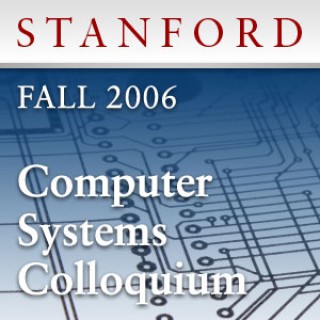
Computer Systems Colloquium (Fall 2006)
Follow Computer Systems Colloquium (Fall 2006)The Computer Systems Laboratory Colloquium is the regular, weekly colloquium of the Computer Systems Laboratory. At each session, a guest lecturer examines some topic on current research and developments in computer systems. Speakers are drawn from industry, government, research, and educational ins…
- Jun 25, 2007 LATEST EPISODE
- infrequent NEW EPISODES
- 1h 16m AVG DURATION
- 9 EPISODES
More podcasts from Stanford University
Latest episodes from Computer Systems Colloquium (Fall 2006)

The Adobe Flash Player is almost universally available on desktop computers, yet many people are not even aware of its existence or of its capabilities. (December 6, 2006)

In this talk, Ian Buck provides a brief history of computing with GPUs, how CUDA can solve compute intensive problems, and where GPU computing will be going in the future. (November 29, 2006)

Richard Chuang guides you through the challenges that span many cycles of changes in the entertainment industry as well as the changes in technology. (November 15, 2006)

William Dally discusses exploitation of parallelism and locality with examples drawn from the Imagine and Merrimac projects and from three generations of stream programming systems. (November 1, 2006)

This presentation traces how the changing connectivity landscape drove the development of new security protocols, especially in the case of wireless networks. (November 8, 2006)

The implications of Compressed Sensing (CS) are promising for many applications and enable the design of new kinds of cameras and analog-to-digital converters. (October 18, 2006)

Computer science, engineering, software, hardware, computer science, PC, IT, processor, parallelism, silicon implementation, chip architecture, circuit design, CAD, computer aided design, embedded, programming languages, compilers, numerical analysis, tec

David Shaw describes the current state of the art in biomolecular simulation and explores the potential role of high-performance computing technologies in extending current capabilities. (October 11, 2006)

The evolution of high-performance microprocessors has recently gone through a significant inflection point. (September 27, 2006)

















